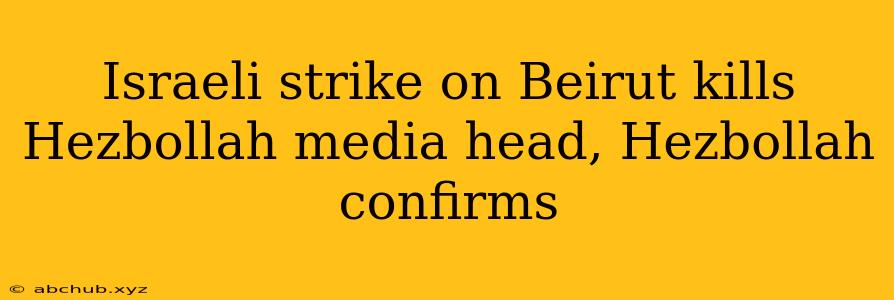A targeted Israeli airstrike in Beirut has killed a senior Hezbollah media official, the group confirmed early this morning. The attack, which occurred late Tuesday night, has significantly escalated tensions in the already volatile region and sparked international condemnation. The incident marks a dramatic escalation in the ongoing conflict between Israel and Hezbollah, raising concerns about a potential wider regional conflict.
The Victim: A Key Figure in Hezbollah's Propaganda Machine
The targeted individual, identified by Hezbollah as [Insert Name of Hezbollah Media Official Here], held a significant position within the organization's media apparatus. [He/She] was responsible for [Insert Specific Responsibilities, e.g., managing the group's television channel, overseeing online propaganda campaigns, coordinating media relations with international outlets]. [His/Her] death represents a major blow to Hezbollah's ability to shape its narrative and project its image both domestically and internationally. [His/Her] influence extended beyond simple media management; [He/She] was known to [Insert details about influence and connections, e.g., be a key advisor to senior leadership, have close ties to Iranian Revolutionary Guard Corps (IRGC)]. The loss of such a key figure will undoubtedly impact Hezbollah's strategic communication efforts.
Immediate Aftermath and Reactions
Following the strike, Hezbollah issued a statement confirming the death of their media official and vowing swift retaliation. The statement condemned the attack as an act of "state terrorism" and accused Israel of deliberately targeting a civilian. [Quote relevant excerpts from the statement]. The group's supporters took to social media, expressing outrage and vowing revenge.
The Israeli government has yet to officially comment on the attack, maintaining its usual policy of ambiguity regarding such operations. However, Israeli media outlets, citing unnamed security sources, reported that the strike was a targeted operation aimed at neutralizing a key figure in Hezbollah's military intelligence network. [Insert details about the conflicting reports and narratives]. This lack of clear communication further fuels the tension and uncertainty surrounding the situation.
International Condemnation and Growing Concerns
The incident has drawn sharp criticism from various international actors. [Mention specific countries or organizations and their statements, e.g., The United Nations called for restraint, the European Union expressed concern over the escalation, and Lebanon's government issued a strongly worded statement condemning the attack.] Many international observers fear that the attack could trigger a wider conflict, potentially drawing in other regional players.
The Risk of Wider Conflict
The assassination of a high-ranking Hezbollah official raises the specter of a significant escalation. Hezbollah, a powerful paramilitary group with a history of cross-border attacks, is known for its retaliatory capabilities and its close ties to Iran. Any response from Hezbollah could provoke a strong Israeli counter-response, leading to a dangerous cycle of violence. The potential for regional involvement, especially given Iran's support for Hezbollah, further complicates the situation and significantly raises the stakes.
Analyzing Hezbollah's Potential Responses
Several potential responses from Hezbollah are currently being speculated upon. These include:
- Targeted attacks against Israeli interests: This could involve attacks on Israeli military targets within Lebanon or potentially across the border in Israel.
- Rocket attacks against northern Israel: A more widespread response involving the launch of rockets from Lebanon.
- Proxy attacks: Hezbollah might use its network of proxies in other countries to carry out retaliatory actions.
- Cyber attacks: Targeting Israeli infrastructure or systems.
- A more measured response: Focus on diplomatic pressure and condemnation rather than direct military action.
The Broader Context: Ongoing Tensions in the Region
This targeted strike comes amid a backdrop of heightened tensions between Israel and Hezbollah. [Provide context on recent events, e.g., border skirmishes, intelligence operations, accusations of weapons smuggling]. The ongoing conflict in Syria, where Hezbollah has played a significant role supporting the Assad regime, further complicates the situation. The regional power dynamics, including the influence of Iran and the involvement of other actors, make it a very volatile environment.
The Role of Iran
Iran's support for Hezbollah is a critical element in this equation. Iran's relationship with Hezbollah is strategic and deep-rooted, and any attack on Hezbollah is effectively viewed as an attack on Iranian interests. Iran's response to this incident, whether direct or indirect, will significantly influence the subsequent developments in the region. [Explore Iran's potential response options].
The International Community's Role in De-escalation
The international community now faces the challenge of de-escalating the situation and preventing a wider conflict. Diplomacy will be crucial in urging restraint from all parties involved. International pressure on both Israel and Hezbollah to avoid further escalation will be vital in preventing the situation from spiraling out of control. [Discuss possible diplomatic strategies].
Long-Term Implications and Uncertain Future
The long-term implications of this targeted strike remain uncertain. The immediate future looks precarious, with the potential for further violence and retaliation. The assassination has undoubtedly shifted the regional dynamics and may lead to a period of heightened instability. The international community will need to closely monitor the situation and work to prevent further escalation. The incident serves as a stark reminder of the ongoing fragility of peace in the region and the high stakes involved.
| Potential Hezbollah Response | Likelihood | Impact on Regional Stability | International Response |
|---|---|---|---|
| Targeted attacks on Israeli assets | Medium | High | Condemnation, potential for increased sanctions |
| Rocket attacks on northern Israel | High | Very High | Increased military readiness, potential for intervention |
| Proxy attacks | Medium | High | Difficulty in attribution, potential for escalation |
| Cyber attacks | Medium | Medium | Sanctions, diplomatic pressure |
| Measured response | Low | Low | Reduced risk of further escalation |
This is a developing situation, and further updates will be provided as they become available. The information presented here is based on currently available reports and analysis. The situation is dynamic and rapidly evolving.
Note: Remember to replace the bracketed information with accurate details as they become available from reliable news sources. This template provides a structure for a journalistic article; always verify information before publication.
